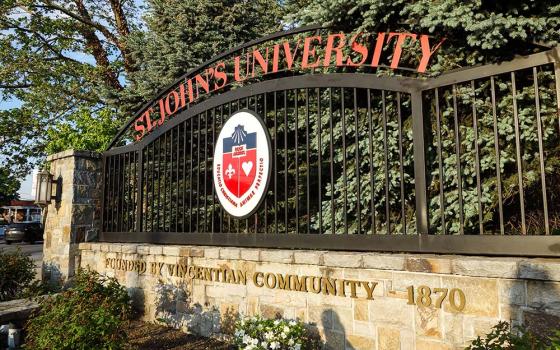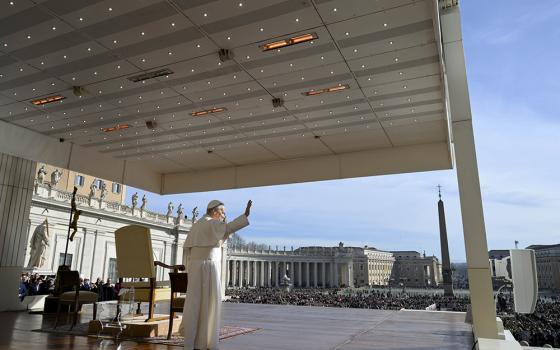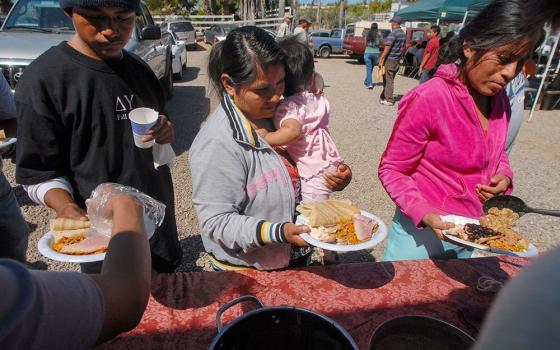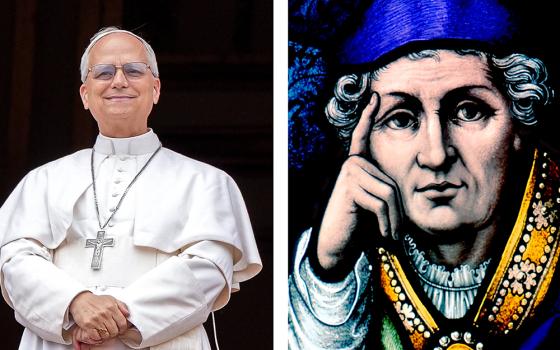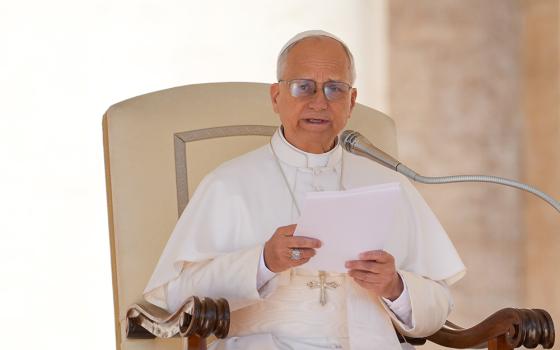Pope Leo XIV speaks on the central balcony of St. Peter's Basilica at the Vatican May 8, 2025, following his election during the conclave. (OSV News/Reuters/Yara Nardi)
Pope Leo XIV bluntly called out inequality and indifference to the plight of the poor in the first major teaching document of his pontificate.
"In a world where the poor are increasingly numerous, we paradoxically see the growth of a wealthy elite, living in a bubble of comfort and luxury, almost in another world compared to ordinary people," the pope wrote. "We must not let our guard down when it comes to poverty."
Released on Oct. 9, the apostolic exhortation Dilexi Te ("I Have Loved You") sets the tone for Leo's pontificate with a passionate call for solidarity with those on society's margins and calling charitable works "the burning heart of the Church's mission."
Leo signed the document on Oct. 4, the feast of St. Francis of Assisi.
The pope noted that the exhortation — a teaching document meant to have a more pastoral tone than the doctrinal weight of an encyclical — had been in the works in the final months of Pope Francis' life. "I am happy to make this document my own," Leo wrote in the document, explaining that he added his own reflections, but still heavily quoted from his predecessor — 57 times in the document's 130 citations — in a clear sign of continuity.
While the document's pastoral tone urges a renewed spiritual concern for the marginalized, it also carries sharp edges. For example, it denounces people who internalize indifference by placing their faith in the free market instead of allowing themselves to be consumed by compassion for their neighbor.
'Religion … cannot be limited to the private sphere, as if believers had no business making their voice heard with regard to problems affecting civil society and issues of concern to its members.'
—Pope Leo XIV
Dilexi Te calls out Christians who "find it easier to turn a blind eye to the poor," justifying their inaction by reducing faith to prayer and teaching "sound doctrine," or by invoking "pseudo-scientific data" to claim that "a free market economy will automatically solve the problem of poverty."
"There is no shortage of theories attempting to justify the present state of affairs or to explain that economic thinking requires us to wait for invisible market forces to resolve everything," Leo wrote. "Nevertheless, the dignity of every human person must be respected today, not tomorrow, and the extreme poverty of all those to whom this dignity is denied should constantly weigh upon our consciences."
The pope particularly condemned a view of the church which caters to the elite by arguing that the church is most effective by building relationships with those in society who carry the greatest influence.
"It is easy to perceive the worldliness behind these positions, which would lead us to view reality through superficial lenses, lacking any light from above, and to cultivate relationships that bring us security and a position of privilege," Leo wrote.
Pope Leo XIV signs his first apostolic exhortation, "Dilexi Te" ("I Have Loved You"), in the library of the Apostolic Palace at the Vatican Oct. 4, the feast of St. Francis of Assisi, as Archbishop Edgar Peña Parra, the substitute secretary for general affairs at the Vatican Secretariat of State, looks on. The exhortation was released Oct. 9. (OSV News/Reuters/Vatican Media)
The exhortation also points out that throughout history "Christian movements or groups have arisen which show little or no interest in the common good of society and, in particular, the protection and advancement of its most vulnerable and disadvantaged members."
"Yet we must never forget that religion, especially the Christian religion, cannot be limited to the
private sphere, as if believers had no business making their voice heard with regard to problems affecting civil society and issues of concern to its members," the pope said.
Blending biblical reflection with the writings of the church fathers, Leo said that Christians encounter Christ above all in the poor. He challenged entrenched prejudices — both within the church and in wider society — that portray poverty as a personal choice and denounced what he called a "specious view of meritocracy" that treats the poor as undeserving of a dignified life.
'I am convinced that the preferential choice for the poor is a source of extraordinary renewal both for the church and for society.'
—Pope Leo XIV
The document devotes significant space to tracing the church's long history of caring for the poor in an extensive, though not exhaustive, account of its charitable and spiritual tradition. It includes the early church fathers' reflections on the poor as a path to holiness, the church's ministry to the sick, the contemplative link between prayer and poverty, the ransoming of prisoners, the rise of mendicant orders in response to urban poverty, and the enduring efforts to educate the poor and accompany migrants along their journeys.
Leo articulated how historically, care for the poor has been the engine that has driven church renewal, from Vatican II to the developments in Latin American theology that had since been incorporated into the wider church.
"I am convinced that the preferential choice for the poor is a source of extraordinary renewal both for the Church and for society," the pope wrote, echoing the language of Latin American liberation theologians who coined the term "preferential option for the poor."
That notion, linked to liberation theology, holds that the church must give special concern and priority to the needs of the poor, the marginalized and the oppressed.
A person asks for alms near St. Peter’s Square at the Vatican Oct. 8, 2025. (CNS/Lola Gomez)
Leo, who spent more than two decades as a missionary and bishop in Peru, drew heavily from Latin American theology in drafting the document, citing various documents that came out of meetings of Latin American bishops that followed Vatican II.
Calling learning from the poor "an inescapable challenge for the Church today," Leo wrote that "the poor are possessed of unique insights indispensable to the Church and to humanity as a whole," advancing the idea affirmed in the 2007 meeting of Latin American bishops in Aparecida, Brazil, that the poor are not "objects of charity on the part of others" but "subjects capable of creating their own culture."
"Not infrequently, our prosperity can make us blind to the needs of others, and even make us think that our happiness and fulfillment depend on ourselves alone, apart from others," the pope wrote. "In such cases, the poor can act as silent teachers for us, making us conscious of our presumption and instilling within us a rightful spirit of humility."
The poor expose the "attitude of aggressive arrogance with which we frequently confront life's difficulties," and "remind us how uncertain and empty our seemingly safe and secure lives may be," he wrote.
Leo also addressed the practice of almsgiving, which he said "nowadays is not looked upon favorably even among believers."
Advertisement
While acknowledging that the "most important way to help the disadvantaged is to assist them in finding a good job," Leo wrote that "we cannot risk abandoning others to the fate of lacking the necessities for a dignified life."
"Consequently, almsgiving remains, for the time being, a necessary means of contact, encounter and empath with those less fortunate," he wrote. "We Christians must not abandon almsgiving."
Presenting the document at a news conference, Cardinal Michael Czerny, prefect of the Dicastery for Promoting Integral Human Development, was asked if the document, coupled with Leo's care for creation and openness to LGBTQ+ Catholics, marks him as a "liberal pope."
"As soon as you say 'a liberal pope,' you pull the pope and the ministry of Peter and his successors onto a very partial platform," the cardinal responded. "It's true, you can interpret these things from a political science or a sociological point of view, and God bless you if you want to do that, but we can't answer in those same terms and we shouldn't."
"Is the Gospel liberal?" he asked. "I guess that's my answer."
The National Catholic Reporter's Rome Bureau is made possible in part by the generosity of Joan and Bob McGrath.

